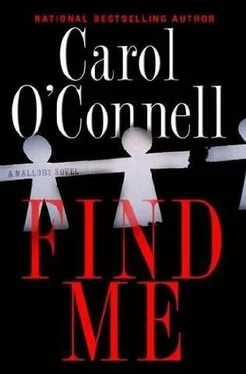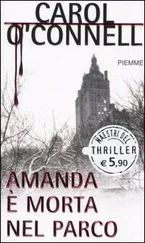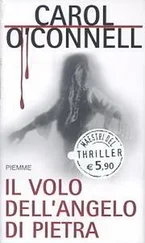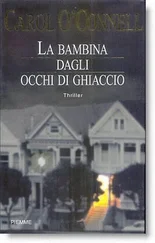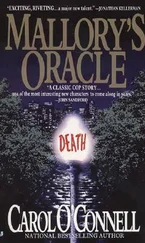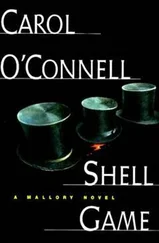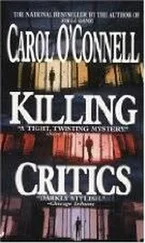The bowl of water lay spilled on the ground by the front tire. Jill’s D ad had opened the passenger door and pulled the wolf out of the cab by its chain. For the first time, the man’s face registered emotion-guilty surprise- when he turned to see Riker standing by the front end of the truck, his gun drawn and aimed at the animal.
“We had a deal,” said the detective. “No unsupervised exercise for the pooch.”
“It won’t happen again.”
“Let’s take a walk.” Riker stooped low to pick up the empty bowl. He stared at the wolf. “He’s probably thirsty. I saw a water fountain down that road.”
The wolf led the way downhill toward the bison pens, and Riker walked behind Jill’s D ad, hoping to get this over quickly. It was best to do it now. All the answers to his questions were not worth the likely cost. The greatest risk was killing the wolf in the presence of the man. “It’s just past that pen,” said Riker, knowing that there was no water fountain.
It should have been predictable that the wolf would want to stop awhile at the chain-link fence that penned the bison. The cold blue eyes were riveted to a small calf. Twenty larger animals abandoned the baby buffalo in their sudden rush to take the sun on the other side of their enclosure. Only the wolf loved the calf. His jaws hung open, panting with love for it, mad to get at it, rising on hind legs, as if he could rip down the metal fence with his front paws. Jill’s D ad pulled on the wolf ’s c hain to drag him down and away. The animal choked, resisting. And now-so fast-he turned on his master. Teeth bared, he crouched, and then he lunged.
Riker fired once. Two shots rang out. The wolf lay dead.
“Sorry, pal,” said the detective, though he knew he could take credit only for the shot to the breast. The bullet that had taken out one blue eye was the one that felled the wolf. Riker turned to see Agent Nahlman, his appointed backup, holstering her gun. Beyond her, he saw a gang of agents on the run, guns out and ready, and Dale Berman was leading them-from the rear.
Riker put his gun away and raised both hands, yelling, “Settle down. The animal went a little nuts. That’s all that happened.” No reporters had turned out yet, and he wondered if gunfire could be heard above the sound of jackals noshing in the buffet room at the top of the road.
Dale Berman stepped to the front of the pack, pushing his people aside, as if they were suddenly in his way and not acting as human shields. He glared at Nahlman and then pointed at the tall thin man with the startled eyes. “Tell me you didn’t s hoot this poor man’s dog.”
Riker shouted, “She saved his life !” And why did this good news seem to disappoint the FBI man?
Turning on his heel, Dale led the posse back up the hill to the restaurant. In that same moment, Jill’s D ad slumped to the ground in a pile of skinny sticks bent at the elbows and knees. “He didn’t e ven know who I was.”
Nahlman knelt down beside him. “I didn’t recognize you, either, Mr. Hastings. The last time we met, you didn’t have that beard. I think you wore a suit and tie that day.”
“It was a brand-new suit,” said the man Nahlman knew as George Hastings. “I bought it for the funeral.” His eyes welled up with tears, and his head moved slowly from side to side. “It wasn’t fair. I had all my paperwork in order.” He reached into his pants pocket and brought out his wallet. Opening it, he produced a folded piece of paper and handed it to Riker. “That’s the permit to bring Jill’s body home on the plane. We bought the plot and the coffin, my wife and me. The stone was ordered. The funeral was all arranged. But that bastard wouldn’t let Jill go. My wife’s still waiting for me to bring our baby home.” He turned to Nahlman. “You people are driving us crazy.”
Riker could guess the rest of the story. Apparently young Jill Hastings had been buried twice. After digging up her body, the feds had interred her under the avalanche of a giant bureaucracy. The detective leaned down to reach inside the other man’s j acket and found the source of the suspicious bulge-not a gun-a plastic catsup bottle. But it smelled like bacon. He squeezed, aiming the nozzle at the ground. “Bacon grease?”
He had to admire George Hastings’ ingenuity, though the plan was full of flaws, entirely too risky and seriously insane. Spattering a federal agent with bacon grease was only a crime in dry cleaners’ circles, but sudden death by starving wolf was an original attention getter. Or maybe the man had never intended to escape the penalty. Riker could see that the father of Jill Hastings was only minutes away from a full confession, and plotting to assassinate a federal agent was worth five years in prison.
“Hey, Nahlman? You don’t w ant to hear any more of this,” he said, as if she had better things to do with her time-as if she did not know what was coming next.
Her head inclined a bare inch to acknowledge her part in an upcoming crime, a conspiracy of silence. The agent walked back up the hill alone.
Riker stared at the dead wolf 's o ne blue eye. “It was a beautiful plan. If you kept your mouth shut, at worst, you’d have to pay a fine.” He nudged the animal with one foot. “No dog tags.” He spoke softly now, going gently with this man. “The target was Dale Berman, right?”
Jill’s D ad nodded. “I’d like to break this to my wife-if that’s all right- before you arrest me.”
“Naw.” The detective waved this idea away with one hand. “Stupid me, I forgot to read you your rights.” He hunkered down because he needed to see this man’s e yes. “So here’s the deal, George. You forget about Dale Berman, and I’ll find your daughter’s body. I’ll send Jill home.”
An hour later, the wolf-the evidence-was buried among the tall pines. Riker locked up the pickup truck, slapped the fender of a state trooper’s car, and sent George Hastings into protective custody for the duration of this hunt for a serial killer. Much as he liked Jill’s D ad, the detective did not trust crazy people to keep their promises.
The caravan was getting underway. He slid into the passenger seat of the Mercedes, and Charles Butler leaned over to ask, “When do you plan to tell Mallory about Savannah Sirus’s suicide?”
“It never seems like the right time,” said Riker. “This morning, I told her April Waylon was dead. She already knew, and she wasn’t taking it well. I think she blames me, and she’s right. April wandered off on my watch.”
“I believe in the car,” wrote Peyton Hale. “Break it down to all the parts and lay them on the floor of a garage. Let’s say that no one has ever seen a car all put together. So what would people make of these separate pieces? There’s some who’d latch onto the battery; it’s familiar, and they know it can power their electric lights. The battery people are not even close to the idea of an automobile; they’ve seen the light, and they’re in the dark. Others would pick up the tires and run them downhill-and lose them that way. They only see a tire’s potential to go somewhere without them. The fenders and the hood, all the exterior metal belongs to the unbelievers; they can see how these parts fit together for a fact, and all they ever see is a shell. Useless, they say.
“Blessed are they who can see the whole car because they’re looking at the road ahead instead of all this crap on the floor of the garage.”
Mallory put the letter back in her knapsack, too distracted to read any more. She started up the car and pulled back onto the old road, Route 66.
The late April Waylon had come to ride in her car for a while. The dead woman was missing one hand, yet she seemed cheerful. “It’s a bright day,” said April’s corpse. “You should be wearing your sunglasses, dear.”
Читать дальше
